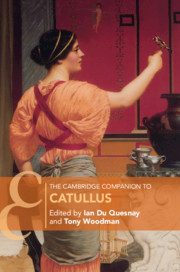Book contents
- The Cambridge Companion to Catullus
- The Cambridge Companion to Catullus
- Copyright page
- Contents
- Notes on Contributors
- Preface
- Introduction
- Chapter 1 Situating Catullus
- Chapter 2 Literary Liaisons
- Chapter 3 Catullan Intertextuality
- Chapter 4 Gender and Sexuality
- Chapter 5 Catullan Themes
- Chapter 6 Language and Style
- Chapter 7 Catullus and Metre
- Chapter 8 Catulli Carmina
- Chapter 9 Catullus and Augustan Poetry
- Chapter 10 Rewriting Catullus in the Flavian Age
- Chapter 11 The Manuscripts and Transmission of the Text
- Chapter 12 Editions and Commentaries
- Chapter 13 Catullus in the Renaissance
- Chapter 14 Catullus and Poetry in English since 1750
- Abbreviations and Bibliography
- Index Locorum
- General Index
Chapter 3 - Catullan Intertextuality
Published online by Cambridge University Press: 09 April 2021
- The Cambridge Companion to Catullus
- The Cambridge Companion to Catullus
- Copyright page
- Contents
- Notes on Contributors
- Preface
- Introduction
- Chapter 1 Situating Catullus
- Chapter 2 Literary Liaisons
- Chapter 3 Catullan Intertextuality
- Chapter 4 Gender and Sexuality
- Chapter 5 Catullan Themes
- Chapter 6 Language and Style
- Chapter 7 Catullus and Metre
- Chapter 8 Catulli Carmina
- Chapter 9 Catullus and Augustan Poetry
- Chapter 10 Rewriting Catullus in the Flavian Age
- Chapter 11 The Manuscripts and Transmission of the Text
- Chapter 12 Editions and Commentaries
- Chapter 13 Catullus in the Renaissance
- Chapter 14 Catullus and Poetry in English since 1750
- Abbreviations and Bibliography
- Index Locorum
- General Index
Summary
Roman literature was by nature intertextual from the beginning, taking on the genres it inherited from the Greeks and adapting them within the constraints and zeities of native Roman prosody, Latin language, and Roman cultural differences. No longer seen under the sign of ‘influence’ or as part of the struggle to look or behave like the father – even when it is a matter of translation – this reality is rather seen as part of the dynamism of a literature that is as contentious, rivalrous and as preoccupied with dominating as the culture and state of which it was a part. Nor is the rivalry simply with the Greeks. Ennius takes an emulative and corrective stance with Naevius, updating his metre and much else. The prologues of Terence show that internal contention is as much a part of the game as any struggle to come to grips with and rearrange the sources in the poets of New Comedy.
- Type
- Chapter
- Information
- The Cambridge Companion to Catullus , pp. 47 - 69Publisher: Cambridge University PressPrint publication year: 2021
- 1
- Cited by



